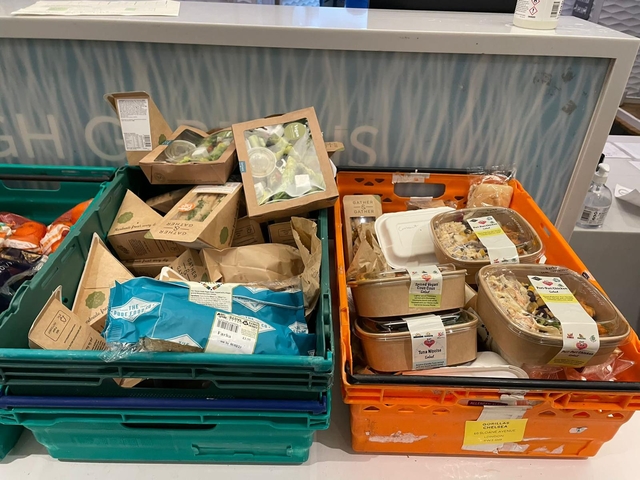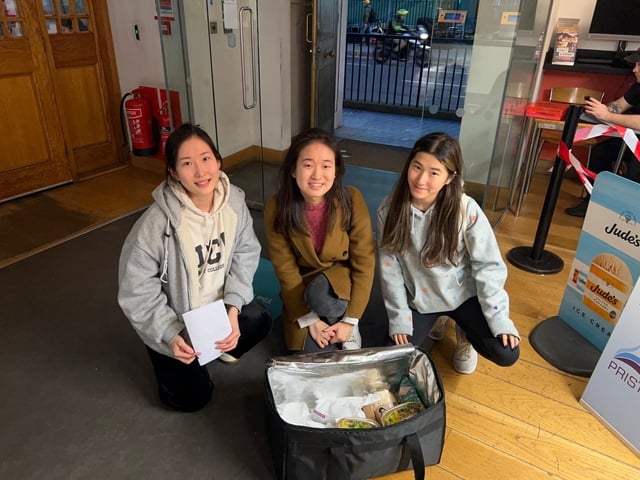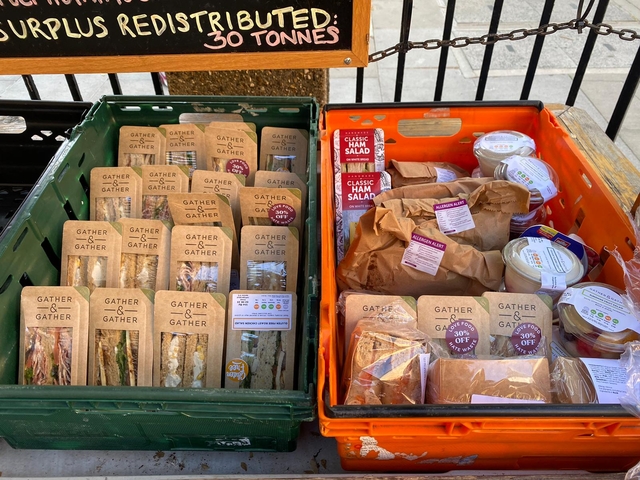Daisy is a second year Psychology student, and she has been doing an amazing job as Project Leader for the #Zero Food Waste SLP, winner for the Student Led Project of the Year award! Discover her story in this Profile Piece, where she tells us about the practicalities and impact of running this project.
Can you tell us a little bit about your project?
#Zero Food Waste is a project that redistributes surplus food from UCL food outlets to homeless shelters or food banks in the local area. We have regular collections from most of the catering company CH&Co’s outlets, all SU cafes, and we recently added Bloomsbury Shop to our list. We go every Wednesday and Friday to collect food from these outlets. Each shift is comprised of a shift leader and a couple of volunteers. The shift leader is mainly responsible for all the paperwork that's required on both the charity side as well as the food business side. And the volunteers’ main responsibility is to help carry the food, because sometimes we get hundreds of sandwiches, which is crazy!
We have a WhatsApp group where volunteers can sign up using a shared spreadsheet once we release shifts, so it’s quite efficient.
Tell us about your Project Leader role.

As a project leader, when I first took over from the previous leaders, the task was to strengthen our relationship with our existing partners and establish new ones. Some of the things I did in this stage were drafting and signing agreements and requesting our charity partners to fill out the paperwork needed.
Once we kicked off the project, my main role (together with the other Project Leader, Claudia) was to supervise the shifts. So say if anything goes wrong or if unexpected things happen during the shift, we are the first point of contact for the shift leaders, so we can support them if they are unclear about the instructions, and if they need any extra hands, we can help them coordinate with other volunteers. At the same time, they can just text in the chat as well, so it's quite an autonomous model that we use.
We also monitor a group chat with the catering company. For example, if they realize at midday that they have a lot of food waste, they will text in that group chat. We would then relay this information to our shift leaders and volunteers and see if anyone can help pick up the food. So we are operating on an ad hoc or same day basis, and that needs quite a bit of coordination.
Essentially, it is a lot of coordination, because it can happen really quickly, so you have to make sure that you send people to the right place and they know what to do in order for all the food to then be delivered to the charity and food banks.
Why did you want to become a Project Leader?
I was already involved in the project during my first year, I was a shift leader back then, and I feel quite passionate about the cause, which is reducing food waste and helping people in need. Toward the end of my first year, I was approached by the previous Project Leader, Patricia, she asked whether I wanted to take on more responsibilities, because I was contributing quite a lot on shifts., I remember she said that becoming a project leader would be a really great opportunity for me to get some skills on project management, coordination, and communication, as I would be talking to lots of stakeholders, not just volunteers.
So it was a combination of wanting to upscale myself but also contributing to a cause that I felt strongly about that made me decide to become a project leader.
What difference do you feel you’ve made by leading your project?
Obviously, it's a teamwork, I couldn't do everything on my own. Together with Claudia, we successfully expanded the scope of the project. It is now benefiting more people I would say, because we're now working with local food banks, which means it's not just people living in shelters that can get the food, but it's also the residents in the area. Also, we are collecting from more places, including the Bloomsbury Shop, Cruciform and IOE café as well. Another new thing we are doing this year is that we also allow them to alert us on the day if there's a huge amount of waste.
We're still hoping to expand more next year, both Claudia and I will remain in this role, and we took another person on board as well, as one major goal that we really want to achieve next year is to collect from catering events.

Overall, I’m really proud of what we achieved this year. So far, we have saved more than 4400 items from going into the bin. I think redistributing surplus food that’s perfectly edible to people that are in need of it, is important especially in light of the cost-of-living crisis.
What impact has volunteering, and leading a project had on you?
I feel like volunteering gives you a sense of achievement and enjoyment. You feel like you're helping people, and that really matters to me personally because I hope that my work can bring positive values to society or have some positive impact at least. I think volunteering is a great way to do this.
And then obviously, especially through being a project leader, I've developed my communication, coordination, and organisational skills. All these soft skills, although they are not like learning a programming language or the hard skills that people always put a lot of emphasis on, are always valued by any employers.
How has your network developed whilst being a Project Leader?
We've built quite good relationships with the people in the charity, and the food banks, so that's nice. Also, when you go to the cafes for collections quite often, you make friends with the café staff as well, which is also quite nice, you can have a chat with them while carrying out your collection work.
Then, because of the work we do, Cicely, who is the sustainability manager at CH&CO, invited us to a Sustainable Eating Workshop, which is like a working group. We act as student representatives in that working group, which works towards achieving sustainable goals at higher levels within UCL. That's something that was totally unexpected, but it was through doing this volunteering project that we got exposed to this level of network. A few enthusiastic UCL staff is trying to set up a food bank as well - they reached out to us and then we got taken on board.
It is super exciting to be part of these bigger projects that support and improve student life at UCL.
What was the biggest challenge you encountered? How did you overcome this challenge?
The biggest challenge I'd say would be miscommunication issues, which keep coming up throughout the entire year.
Sometimes, even when we’ve told everything to the to the manager, when we go for the food collection, the actual staff working there don’t know what our standard is, so it can take some time for the shift leader to explain on the spot what our procedures are and our collection time is. Sometimes the cafés may close early or change their closing time without notifying us, which could be a bit frustrating given that many volunteers have a busy schedule, and we don’t want them to feel like they have wasted time.
I wouldn't say we've completely solved that problem, but the way we approach this is just to be as proactive as possible. We will try to let the shift leaders know that these problems can happen, so that they don't panic when they are actually in that situation. Then when the situation is over, we would relay this information to the manager, and they can explain to the staff.
In principle, we try our best to avoid escalating things and make an effort to take care of our volunteers’ feelings. Behind the scenes, we communicate with our partners as much as needed through email and in-person conversations, and try to resolve the problems we encounter so that the same thing doesn't happen again in the next collection.
Is there anything memorable that’s happened to you whilst being a Project Leader?
Quite recently we managed to save 78 bottles of 2 litre milk from going to the bins…. it's crazy I know! The catering company had a stock management issue and ordered way too much milk. We had to take an Uber from UCL to the charity, even though it's just behind the British Library.
They informed us on the day saying it was 20 bottles of milk, so we thought that was manageable, but then when we actually got to the refectory, the manager said they had way more. Obviously, we didn't want to waste all this milk. So after we contacted the charity to make sure they could take it in, we delivered the milk with the help of our volunteers. All milk went to local residents in the end and didn't get wasted, which was a great relief.
That was quite a memorable thing because we didn't think it would be so much from that one shift. I'm glad that we get funds from the SU that enabled us to get an Uber too because otherwise we wouldn't have been able to transfer all those milk bottles from UCL to the food bank. It’s great to have some budget to allow us to make that emergency decision.
Finally, what is the best piece of advice you would give to someone thinking about being a Project Leader?
My advice is just to go for it. It might be quite intimidating at the beginning, knowing that you will be in charge of this project with only a handful of other people, but honestly, you'll just learn a lot along the journey. Some things you wouldn't even expect to learn. So it's really a good experience that you're going to have.
And just one practical tip is to start planning early, even in the summer, so that your project can kick off as early as possible. Because I remember they told us that we were the first project to actually start operating, and the reason for that was because we started planning in August, even end of July, so by the time the term started we had pretty much all the paperwork completed, and we just needed to recruit people from the volunteering fair. I know, for example, some projects need DBS checks so it might take them longer, but in general, just plan as early as possible – it will make your life much easier later on.
Want to start your own Student-led Volunteering Project? Find out more and share your ideas with us here!


